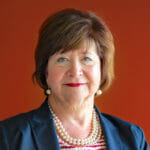COVID-19 has brought challenges and difficulties unlike any I’ve faced as the leader of Nazareth Home for almost two decades. As we live through what likely will be referred to as a crisis or a disaster, it becomes important to use the lessons learned to plan how we can better protect the most vulnerable generations now and in the future.
From the beginning of the pandemic, we knew residents living in the long-term care centers were uniquely at risk to the novel coronavirus. This population is elderly, medically fragile and, many times, immobile. We responded to the pandemic in early March by closing our door to visitors, before there was a mandate. Although we knew it was the best way to keep our elders safe, not allowing visitors also created a sense of loss. Socializing is a critical part of physical and mental well-being and, for us, very important to our healing mission.
The success of Nazareth Home’s mission comes from our commitment to relationships. The relationships that build our strong community represent a triangle, the strongest geometric shape. We rely on our team, elders and families to build a culture of community at our campuses. When one of those three components is missing, we are missing a critical piece of our infrastructure.
When we closed our doors to visitors, we knew it would be difficult not to have families visit, but we had no idea the loss we all would feel. Not only are the elders missing their family connections, but we as staff also are longing for that as well. The support, relationships and communication are all things we have missed as our families are not within our walls. A key takeaway is never to take for granted the importance of each group in our community — the three sides of the triangle.
As a team, we brainstormed to find creative ways for the elders to see their family members. Although it doesn’t replace face-to-face visits, we have helped with Skype and FaceTime, scheduled window visits, orchestrated drive-by parades, and created family photo albums using It’s Never 2 Late technology.
During this time, we have seen the bond between staff members and elders grow. We always have been one big family, but now those bonds are stronger. We all are going through this together and are here for each other during this difficult time. Our elders teach us about how they have survived hard times in the past, and we work to keep them engaged and healthy while isolated.
Our dedicated staff never has stopped fighting to protect the elders living at both Nazareth Home campuses in Louisville, KY. Working closely with state and local health officials, we work around the clock to ensure that elders and employees are safe.
We created separate COVID-19-only units to accommodate COVID-19 positive elders, with the same nurses, aides, therapists and support staff providing care only in these units. Employees have made many sacrifices to isolate when at home to ensure fellow staff members and elders’ protection.
We ramped up testing of both elders and staff, with staff being tested weekly and, when needed, twice per week. The pandemic has pushed our employees into tough new ways of working, demanding adaptability and resilience.
These working conditions made it imperative that we focus not only on our employees’ physical health, but also on their mental health. Our staff members have felt uncertain, stressed, anxious and even angry at times. We must keep them physically safe and their emotional health top of mind. We try daily to remind staff members to take care of themselves, and we strive to create a working environment that still allows for celebrations and fun, from wacky hair day to free lunch to an afternoon ice cream treat.
In implementing these new practices, transparent communication with staff, elders and families is the most important. Everyone in our triangle needs to know, at all times, how we are doing and what challenges we are facing. We’re in this together, and that means regularly communicating with one another.
The best public health information available today may be different tomorrow, and we need to make sure we convey this to our teams quickly. Our OnShift messaging service allows us to push out new information to our employees. For families, we use a service called One Call Now that sends texts and emails with the latest updates. We use all of our social media platforms, as well as personal phone calls. In a crisis, communication is key to making it through stronger.
Future responses to any pandemic must be faster and more community comprehensive. As an industry, we have seen our weaknesses and need help from legislators and the broader community to solve the existing problems that COVID-19 made critical. Yet we will persevere and, in the long run, we will come out stronger, more knowledgeable and ready to face whatever the future holds. Internally, at Nazareth Home, our triangle may have been hard-pressed on each side, but we see that our mission is strong and will allow us to continue serving elders with the person-centered care they deserve.
Mary Haynes is CEO of Nazareth Home, Louisville, KY.




